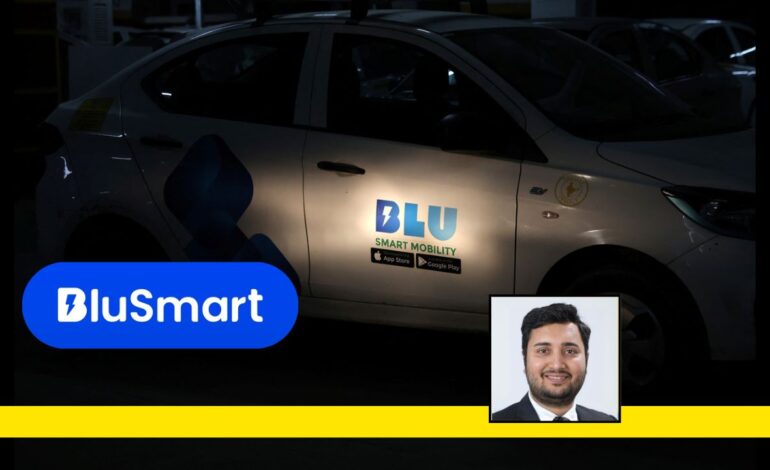
In April 2025, BluSmart, once hailed as India’s most promising electric vehicle ride-hailing startup, abruptly suspended all operations across Delhi-NCR, Bengaluru, and Mumbai. What began as an innovative solution to urban mobility challenges ended as a cautionary tale of financial misconduct, corporate governance failures, and systemic business vulnerabilities. The company’s collapse sent shockwaves through India’s startup ecosystem and has profound implications for investor confidence, regulatory oversight, and the future of green mobility initiatives.
The Rapid Rise and Sudden Fall
Founded in January 2019, BluSmart positioned itself as an environmentally conscious alternative to traditional ride-hailing services. With a focus on sustainability, reliability, and a zero-cancellation policy, the company quickly gained traction in major urban centers. At its peak, BluSmart operated over 8,700 electric vehicles and managed more than 6,300 charging points across three cities.

The company’s growth trajectory appeared impressive:
- By early 2024, BluSmart reported annual revenue of ₹390 crore
- In February 2024, it announced a solar partnership with Tata Power
- By July 2024, it had secured ₹200 crore in fresh funding
Yet beneath this veneer of success, serious problems were developing.
The collapse unfolded rapidly:
- February 2025: BluSmart defaulted on ₹30 crore in non-convertible debentures
- March 2025: Gensol Engineering’s credit rating was downgraded to default status
- March-April 2025: Senior executives, including the CEO, began resigning
- April 15, 2025: SEBI issued an interim order exposing significant fund diversion at Gensol Engineering
- April 17, 2025: BluSmart suspended all operations
- April 18, 2025: Independent directors resigned from BluSmart’s board

The SEBI Investigation: Uncovering Financial Misconduct
The Securities and Exchange Board of India’s investigation revealed a pattern of financial misconduct at the heart of BluSmart’s collapse. According to SEBI’s interim order, the Jaggi brothers—who were both co-founders of BluSmart and promoters of Gensol Engineering—had diverted at least ₹262 crore from a ₹978 crore loan intended for purchasing 6,400 electric vehicles for BluSmart’s fleet.
The investigation found that only 4,704 vehicles were actually purchased, with substantial funds allegedly redirected toward:
- Luxury real estate acquisitions
- Personal foreign travel
- Other non-business expenses
SEBI’s order characterized Gensol Engineering as operating with minimal financial discipline, with the promoters treating company resources as a “personal piggy bank.” This misappropriation of funds directly impacted BluSmart’s ability to maintain and expand its fleet, ultimately compromising its operational capabilities.
The Fatal Flaw: Business Model Vulnerabilities
BluSmart’s business structure contained a critical weakness that few observers recognized until it was too late. Most of BluSmart’s vehicles were owned by Gensol Engineering and leased to BluSmart—creating a dangerous dependency that proved catastrophic when Gensol faced financial difficulties.
As Gensol’s liquidity crisis deepened, the company began selling off nearly 3,000 EVs to manage its mounting debt. This directly crippled BluSmart’s operational capacity, leaving the ride-hailing service without sufficient vehicles to serve its customer base.

A proposed sale of vehicles to Refex Green Mobility fell through, further exacerbating the situation and leaving BluSmart without viable alternatives to maintain its fleet size. Without adequate vehicles, the company could neither fulfill customer demands nor generate sufficient revenue to sustain operations.
Corporate Governance Breakdown
The BluSmart case highlights significant corporate governance failures across multiple levels:
- Misleading Disclosures: According to SEBI’s findings, Gensol and BluSmart misled investors and credit rating agencies, hiding defaults and overdue payments. Credit rating agencies ICRA and CARE subsequently downgraded Gensol’s debt, citing concerns about falsified documents.
- Leadership Exodus: As financial troubles mounted, BluSmart experienced a mass departure of senior executives. The company’s CEO, Chief Business Officer, Chief Technology Officer, and VP of Experience all resigned, leaving BluSmart without strategic direction during a critical period.
- Board Oversight Failures: The resignation of independent directors following SEBI’s regulatory action raised serious questions about the effectiveness of board oversight and internal controls at BluSmart.
- Related-Party Transactions: The intertwined relationship between BluSmart and Gensol created opacity that made it difficult for regulators, investors, and other stakeholders to properly assess the company’s financial health and operational sustainability.
Widespread Impact on Stakeholders
The collapse of BluSmart affected multiple stakeholder groups:
Employees and Drivers:
- Approximately 500 employees were left without clear employment status
- An estimated 10,000 driver partners suddenly lost their source of income
Customers:
- Thousands of daily users across three major cities were left without service
- Prepaid customers faced uncertainty about refunds
Investors:
- Institutional investors saw significant devaluation of their investments
EV Ecosystem:
- Charging infrastructure partners and vehicle maintenance providers lost a major client
- The broader electric mobility ecosystem faced reputational damage from this high-profile failure

Implications for India’s Startup Ecosystem
The BluSmart collapse carries significant implications for multiple aspects of India’s startup ecosystem:
Investor Trust and Due Diligence
The case demonstrates the critical importance of thorough due diligence processes that extend beyond growth metrics to examine corporate governance structures, related-party transactions, and financial controls. Investors are likely to implement more rigorous assessment frameworks, potentially slowing investment flows into early-stage companies but improving the quality of funded ventures.
Regulatory Oversight
SEBI’s investigation, while ultimately revealing the misconduct, came only after significant financial damage had occurred. This raises questions about how regulatory frameworks might evolve to provide earlier detection of similar issues in the future. Preventive regulatory measures, rather than reactive investigations, may become an area of focus.
Business Model Sustainability
BluSmart’s dependence on Gensol Engineering exposed the dangers of single-point vulnerabilities in startup business models. Future ventures will likely face greater scrutiny regarding operational dependencies, supply chain resilience, and contingency planning.
Impact on EV Sector
While BluSmart’s collapse is a significant setback for India’s electric mobility sector, it does not necessarily invalidate the fundamental case for EV adoption. However, it does highlight the need for sustainable business practices and governance to match sustainable environmental goals.
Lessons for the Future
The BluSmart case offers several important lessons for India’s startup ecosystem:
- Corporate Governance Is Not Optional: Strong governance practices, financial controls, and board oversight are fundamental requirements for sustainable growth, not bureaucratic hurdles.
- Diversification of Critical Dependencies: Over-reliance on a single supplier, partner, or related entity creates dangerous vulnerabilities that can threaten entire business models.
- Transparency with Stakeholders: Open communication with employees, customers, and investors about company challenges might have identified issues earlier and potentially facilitated interventions.
- Balance Growth with Governance: While rapid scaling is often celebrated in startup culture, sustainable growth requires appropriate governance structures that evolve as the company expands.
As BluSmart remains suspended and SEBI’s investigation continues, the full impact of this collapse is still unfolding. However, it already represents a watershed moment for India’s startup ecosystem—particularly in the EV and mobility sectors.

The BluSmart story demonstrates that behind innovative technologies and ambitious visions lie fundamental business principles that cannot be ignored. In the aftermath of this failure, India’s startup ecosystem faces a crucial period of reflection and recalibration, with greater emphasis on governance, transparency, and sustainable business practices.
For regulators, investors, entrepreneurs, and customers alike, the BluSmart collapse offers a stark reminder that true innovation requires not just technological advancement but also organizational integrity and financial discipline. How India’s startup community internalizes these lessons will significantly influence the next chapter of the country’s entrepreneurial journey.











Very good https://shorturl.at/2breu
On one end, no proper monitoring and on another end, no support for genuine entrepreneurs…pl ref one agitated entrepreneur retaliated Mr.Piyush Goyal on his unsavory remarks about Indian startup companies…